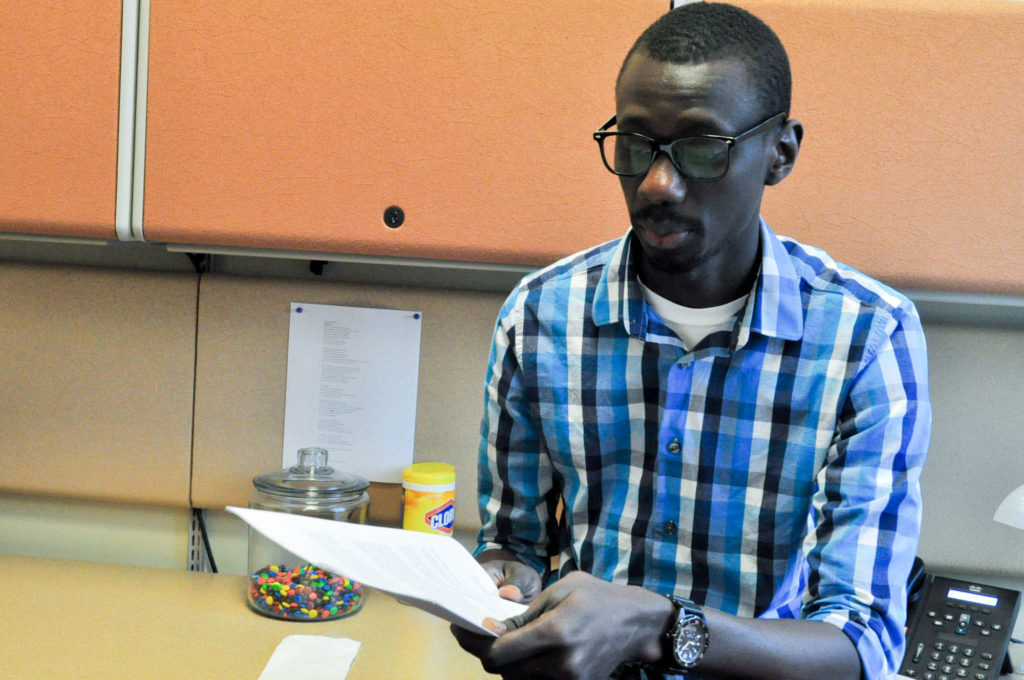SGSU 2018 Legislative Agenda Prioritizes Inclusion, Access for Marginalized Students
Student Government of Seattle University President Pa Ousman Jobe is upholding his promise to make student government policy more accessible to all students.
SGSU recently released its legislative agenda which outlines priorities and initiatives for the 2017-18 academic year. The agenda focuses on inclusivity, increasing access to resources and partnering with existing clubs and organizations and their work.
This year’s SGSU agenda upholds the work and progress of last years cohort, but is different from previous years in that it was developed with the help of the newly formed External Advisory Board, a group of student representatives from clubs and organizations on campus who were invited to give their input.
Jobe said that the advisory board will better serve the interests of students and get them directly involved in the priorities of student government.
“It was really important for that choice piece to be in it, for students and different constituencies to have their voice be part of this document,” he said.
Jobe emphasized that there is a multitude of ways in which people coming from marginalized backgrounds are excluded on campus and may not feel a sense of belonging. ere is no one action, he said, to improve the climate.
“Inclusivity goes on a very huge spectrum. So, it would require critical examining,” Jobe said. “Because if you are a person of privilege, you will not think about it because you will go, ‘Oh everything is normal.’”

SGSU President Pa Ousman Jobe discussing the immense amount of time many members of SGSU committed.
Jobe said that the agenda looks to create an environment in which students who are currently isolated due to their lack of representation can begin to feel represented and thrive in the Seattle U community by challenging the structures that keep those students in the frays.
To address the broader goal of improving inclusivity, SGSU will begin the Unnamed Project, which will include partnering with the Office of Diversity and Inclusion as well as producing a documentary surrounding Seattle U students. The Unnamed Project is meant to bring light to the experiences of those who often go unheard.
“The project is meant to serve as a platform for students with marginalized identities who o en feel unnamed, unheard, and who often have to deal with a whole lot of micro aggressions due to their marginalized identities,” Jobe said.
SGSU Transfer Representative Maitland Hennessy is hoping to increase awareness for resources for transfer students, particularly the technological services on campus like the Media Production Center. She supports the document’s focus on improving campus climate.
“Making sure that we are creating a diverse, inclusive, kind campus is one of the best goals any student government could have at this point in time,” Hennessy said.
The agenda also outlines the need for financial transparency within SGSU and the Seattle U administration, as Jobe said this has been an issue in the past. The university and SGSU have an obligation, Jobe said, to their community to be clear about where their funds are going.
In order to best serve students experiencing mental illnesses and survivors of sexual assault, the agenda outlines a plan to join with campus partners such as Counseling and Psychological Services (CAPS) and the Survivor Support Network to bridge the gap between resources the university is providing and what students need.
“We also realized that there was another gap, that sometimes there are some resources but students do not know about it or do not know about the channels of going about it,” Jobe said.
SGSU Commuter Representative Jess Juanich is excited for the document’s attention to resources for students with disabilities, commuter students and transfer students.
“The legislative agenda is very focused and it can actually set a direction for SGSU and where we want to go within the next year,” Juanich said.
Additionally, the legislative agenda provides initiatives for creating a system that will work for the needs of students who do not t into the gender binary.
Jobe said he’s heard from students who don’t feel entirely comfortable in their housing due to the university’s lack of housing options for non- binary and trans students. Jobe says SGSU will partner with Housing and Residence Life to create housing in which students can feel entirely comfortable.
Jobe is hopeful that the agenda can be an additional step in improving the Seattle U climate and notes that, until issues like micro aggressions and bias are eradicated from campus, there is still work to be done.
“Culture doesn’t change overnight. But that also doesn’t mean that we should just throw our hands up in the air and leave,” Jobe said. “My hope is that it would at least to a certain degree bring up some change which is needed and then be followed up by whoever else is going to come.”
Sofía may be reached at
swells@su-spectator.com


